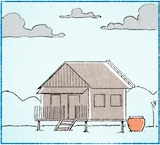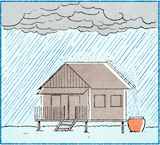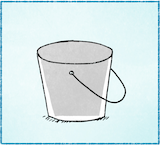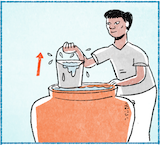



นี้คืออี่หยัง นี้คือบ้าน หลือเฮียนนั้นหละ
เฮียนมีหลังคาพ้อม หลังคาเป็นลูบสามเหลี่ยม เป็นลูบสามเหลี่ยมสองอัน
เฮียนหลังนี้มีบันไดพ้อมแม่นบ่ แม่น มีบันไดพ้อม มีบันไดขึ้นเฮียน แต่ว่าอยู่หน้าบ้าน บ่ได้อยู่ในบ้าน อยู่ข้างนอกบ้านนั้นหละ
บันไดอันนี้เป็นซั้นๆ พ้อม มีหลายซั้นบักคักหนึ่ง เฮ็ดจากอี่หยังกะบ่ฮู้ หน้าสิเฮ็ดจากไม้
แล้วข้างๆ บ้านกะมีโอ่งพ้อม มีโอ่งใบน้อยๆ หนึ่ง
โอ่งเป็นใบสีแดง ใบบ่ใหญ่หลาย โอ่งกะมีฝาปิดพ้อม
อยู่หลังบ้านกะมีท้องฟ้าพ้อมแม่นบ่ แม่น มีท้องฟ้าพ้อม มีก้อนเมกพ้อม ก้อนเมกสามก้อน ก้อนบักใหญ่หนึ่ง แต่กะบ่ใหญ่หลาย
เฮียนหลังนี้มีหน้าต่างพ้อม หน้าต่างเป็นลูบสี่เหลี่ยม มีหกบาน บานเป็นบานสี่เหลี่ยม บานบ่ใหญ่หลาย กะบานน้อยๆ หนึ่ง
เฮียนหลังนี้เฮ็ดมาจากอี่หยัง เฮียนหลังนี้เฮ็ดมาจากไม้ อาดสิเป็นบ้านไม้กะได้ เฮ็ดจากไม้ บ่ได้เฮ็ดจากปูน
บ้านหลังนี้คือสูงแท้ จักคือกัน กะสูงอยู่ เพาะว่าบ้านอันนี้มีสองซั้น เป็นบ้านสองซั้น ซั้นข้างล่างบ่มีอี่หยัง แต่ว่าซั้นข้างเทิงนั้นเป็นบ้าน
2
นี้คืออี่หยัง นี้กะคือบ้านคือเก่านั้นหละ
ตอนนี้กะเป็นบ้านเลียนไทยหลังเก่า เป็นบ้านไม้ เป็นเฮียนไม้หลังเก่านั้นหละ
ตอนนี้ อยู่บ้านหลังนี้ ฝนกำลังตกแม่นบ่ แม่น ฝนกำลังตกลงมา คือสิตกแฮงเติบ เป็นเม็ดฝน ตกลงมาบักแฮง แฮงบักคักหนึ่ง
แล้วอยู่ข้างบ้านกะมีโอ่งพ้อม มีโอ่งแดงน้อยนั้นหละ โอ่งบ่ใหญ่หลาย เอาไว้โต่งน้ำ เอาไว้ฮองน้ำนั้นหละ หลือเอาไว้เก็บน้ำ
เพาะว่าญามฝนตกมาแล้ว เฮากะสิเอาโอ่งนี้ไว้เก็บน้ำ เอาไว้ถ้ากิน เก็บน้ำเอาไว้ถ้าใซ้งาน หลือเอาไว้ถ้ากินนั้นหละ
3
นี้คืออี่หยัง นี้คือกะคุ หลือถังนั้นหละ
กะคุอันนี้เฮ็ดมาจากอี่หยัง เฮ็ดมาจากเหล็กกะได้ เฮ็ดมาจากพะสะติกกะได้ เฮ็ดได้หลายอย่าง เฮ็ดได้จากหลายสิ่งหลายอย่าง เอาหลายสิ่งหลายอย่างมาเฮ็ดเป็นกะคุกะได้
เพาะว่า ขั้นเฮ็ดให้มันทนทาน มันกะสิใซ้ได้โดน ขั้นเฮ็ดบ่ทนบ่ทาน มันกะใซ้ได้บ่โดน
กะคุอันนี้เอาไว้เฮ็ดหญัง เอาไว้ถ้าตักน้ำ เอาไว้ถ้าใส่ของ ใส่ได้หลายอย่าง สามาดเอาสิ่งเล็กๆ น้อยๆ ใส่เข้าไปในกะคุนี้ได้ หลือเอาไว้ถ้าใซ้งานได้หลายสิ่งหลายอย่างคือกัน
4
เขากำลังเฮ็ดหญัง เขากำลังตักน้ำ
พุซายคนนี้เขากำลังสิตักน้ำ
เขาใซ้กะคุใบนั้นหละ ใบน้อยๆ ใบบ่ใหญ่หลาย เขากำลังใซ้กะคุนั้นตักน้ำขึ้นไป ตักน้ำอยู่ในโอ่ง
เขาตักน้ำอยู่ใส เขาตักน้ำอยู่ในโอ่ง เขาใซ้กะคุตักน้ำขึ้นไปจากในโอ่ง
เป็นหญังเขาคือตักน้ำ เขาอาดสิเอาน้ำไปกิน หลือเอาน้ำไปใซ้งาน หลือเอาไปเฮ็ดต้มเป็นแนวกินกะได้ กะอันนี้กะบ่ลู้คือกัน จักว่าเขาเอาไปเฮ็ดหญัง
เขาใซ้มือข้างขวาของเขาจับกะคุ แล้วกะตักน้ำอยู่ในโอ่งขึ้นไป มือข้างซ้ายของเขากะจับฝาโอ่งอยู่
โอ่งเฮ็ดมาจากอี่หยัง โอ่งเฮ็ดมาจากปูน เฮ็ดมาจากดินกะได้
โอ่งเฮ็ดมาจากปูน เพื่อที่สิให้มันทนทาน สามาดใซ้งานได้โดน หลือสามาดเก็บน้ำได้โดนหลือได้หลายนั้นหละ
Link to overview page
Link to dictionary
| Isaan | Pronunciation | Tones | Thai | English/Notes |
|---|---|---|---|---|
| นี้ | ni: | HF | นี้ | 1. this 2. here |
| คือ | khʉ: | HR | คือ | 1. to be, to resemble, like, as 2. why {บักหล้าคือบ่เก็บโต่ะแน่ = [addressing a young boy] Why haven't you cleared the table?} |
| อี่หยัง | i:-yaŋ | H-M | อะไร | 1. what {นี้คืออี่หยัง = What is this?} {มื้อนี้เจ้าเฮ็ดอี่หยัง = What are you doing today?} {กินเข้างายกับอี่หยัง = What did you have for breakfast?} 2. something, anything, (in negations) nothing {บ่ต้องเฮ็ดอี่หยังอีกเลยนอกจากใส่ปุย = [we] don't need to do anything besides adding fertilizer} |
| บ้าน | ba:n | HF | บ้าน | 1. house, home 2. village (also used as a prefix before the name of a village) 3. home country, home region {บ้านเฮาเฮ็ดเข้าจั่งใด = How do we plant rice in Isaan/Thailand?} |
| หลือ | lʉ: | M | หรือ | or |
| เฮียน | hi:an | HR | เรือน | house, home |
| นั้นหละ | nan-la | HF-M | นั่นแหละ | auxiliary for emphasis at the end of a phrase |
| มี | mi: | HR | มี | 1. to have 2. there is |
| หลังคา | laŋ-ka: | M-HR | หลังคา | roof |
| พ้อม | phɔ:m | HF | พร้อม | at the same time, also, too {มีตะเว็นพ้อม = the sun's out, too} {กะทะมีด้ามพ้อม = the pan has also a handle} |
| เป็น | pen | M | เป็น | 1. to be, to exist 2. to be able to 3. to suffer, sth. happens to 4. เป็นหญัง[...]คือ in initial position: why? {เป็นหญังเขากะคือแปงฟัน = Why is he brushing his teeth?} {เป็นหญังเคี่ยงบินมันคือสิตก = Why is the airplane falling down?} |
| ลูบ | lu:p | HF | รูป | 1. picture, image, photo 2. form, shape 3. clf. for pictures, images, photos |
| สามเหลี่ยม | sa:m-li:am | M-H | สามเหลี่ยม | triangle |
| สอง | sɔ:ŋ | M | สอง | two |
| อัน | an | M | อัน | 1. thing, object 2. general clf. for objects |
| หลัง | laŋ | M | หลัง | 1. back, after 2. back (of body) {ขี่หลังควย = to ride on a water buffalo} 3. clf. for houses {บ้านหลังใหญ่ = a large house} {เฮียนไม้หลังเก่า = an old wooden house} |
| บันได | ban-dai | M-M | บันได | stairs, staircase, ladder |
| แม่นบ่ | mɛ:n-bɔ: | H-H | ใช่ไหม | question particle: ..., right? ..., isn't it? ..., don't you? etc. {เจ้าได้เห็นสิ่งนั้นแม่นบ่ = You've seen that, haven't you?} {ฝนกำลังตกแม่นบ่ = It's raining, isn't it?} {นี้คือกะคุแม่นบ่ = This is a bucket, isn't it?} |
| แม่น | mɛ:n | H | ใช่ | 1. yes 2. affirmative particle |
| ขึ้น | khʉn | LF | ขึ้น | 1. to go up, to increase 2. sun: to rise {ตะเว็นกำลังขึ้น = the sun is rising} 3. more 4. bus/train etc.: to get on, to board {พุโดยสานขึ้นลดไฟเบิดแล้ว = all passengers have boarded the train} |
| แต่ว่า | tɛ:-wa: | H-H | แต่ว่า | 1. but 2. only {ฮู้แต่ว่าเขายืนอยู่พุเดียว = I only know that he's standing there by himself} |
| อยู่ | yu: | H | อยู่ | 1. to be (located) at 2. yet, still 3. auxiliary indicating continuous or progressive action {ทอดปาอยู่ในกะทะ = (in the process of) frying a fish in the pan} {แม่กำลังเมี้ยนเฮียนอยู่ = mother is cleaning/tidying up the house} |
| หน้า | na: | LF | หน้า | 1. front {ปะตูหน้า = front door} 2. face {เขากำลังล้างหน้า = he's washing his face} 3. auxiliary: conditional tense {เขาหน้าสิเป็นพุบ่าวพุสาวกัน = they are probably groom and bride} {กะหน้าสิส้มอยู่ = it's likely to be sour} 4. season {หน้าฮ้อน = hot season} 5. page 6. clf. for pages {เฮาอ่านฮอดหน้านั้นแล้ว = we've read until this page} |
| บ่ | bɔ: | H | ไม่ | 1. no, not 2. question particle, transforming a statement into a question Notes: spelling exception in line with common usage on social media |
| ได้ | dai | HF | ได้ | 1. can 2. to get, to obtain 3. before verb: indicating past tense 4. บ่ได้ + verb: not |
| ใน | nai | HR | ใน | in, within |
| ข้างนอก | kha:ŋ-nɔ:k | LF-HF | ข้างนอก | outside |
| ซั้น | san | HF | ชั้น | 1. floor, shelf, step of a staircase {ซั้นเก็บเสี้ยผ้า = clothes shelf} {ซั้นวางหนังสือ = book shelf} 2. level, grade, class {ซั้นมอสี่ = secondary school grade four} 3. layer |
| หลาย | la:i | M | เยอะ, มาก | many, much, very |
| บักคักหนึ่ง | bak-khak-nʉŋ | M-H-H | intensifier: very, very much (variant of คัก) | |
| เฮ็ด | het | H | ทำ | to do, to make |
| จาก | ja:k | LF | จาก | 1. from {... เฮ็ดมาจากอี่หยัง = ... is made from what?} 2. to depart |
| กะ | ga | M | ก็ | 1. then, consequently 2. also |
| ฮู้ | hu: | HF | รู้ | 1. to know 2. to understand Notes: equivalent to ลู้ |
| สิ | si | M | จะ | future tense auxiliary {เขากำลังสิตื่น = he's about to wake up} {สิไปตะหลาด = [I'm] going to the market} |
| ไม้ | mai | HF | ไม้ | wood, tree |
| แล้ว | lɛ:o | HF | แล้ว | 1. finished 2. already 3. and then, and next (especially แล้วกะ) 4. auxiliary for past tense |
| ข้าง | kha:ŋ | LF | ข้าง | 1. side {มีหูจับสองข้าง = there are handles on both sides} 2. next to {วางอยู่ข้างๆ ก่องใบใหญ่ = it's placed next to the large box} {เขายืนอยู่ข้างๆ อีกพุหนึ่ง = he's standing next to another person} 3. clf. for body parts which come in pairs (eyes, ears, legs etc.) {เขามีตาสองข้าง = she has two eyes} |
| โอ่ง | o:ŋ | H | โอ่ง | big earthen jar (usually for water) |
| ใบ | bai | M | ใบ | 1. leaf {ต้นไม้มีใบสีเขียว = the tree has green leaves} 2. banknote {เทิงมีใบพ้อม เทิงมีเหลียนพ้อม = there are notes as well as coins} 3. clf. for leaves, bank notes, helmets, bowls, jars, pots, boxes {ใบบัว = lotus leaf} {ก่องใบน้อย = a small box} {หม้อใบนี้มีฝาพ้อม = the pot here has a lid, too} {ถ้วยใบสีแดง = a red bowl} |
| น้อย | nɔ:i | HF | น้อย | 1. few, little 2. small |
| หนึ่ง | nʉŋ | H | หนึ่ง | 1. one 2. after adjective: intensifier {บักคักหนึ่ง = very much} {อันบักใหญ่หนึ่ง = very large}, or attenuates the meaning {กะดาดมันแผ่นน้อยๆ หนึ่ง = the piece of paper is [relatively] small} |
| สี | si: | M | สี | 1. color 2. colored pencil, crayon |
| แดง | dɛ:ŋ | M | แดง | red |
| ใหญ่ | ɲai | H | ใหญ่ | large, big |
| ฝา | fa: | M | ฝา | 1. lid {ฝากะปุก = lid of a jar/pot} 2. wall {ฝาบ้าน = wall (of a house) = กำแพงบ้าน} |
| ปิด | pit | M | ปิด | 1. to close {ปิดปะตู = to close the door} {ปิดก่อกน้ำ = to close the tap} 2. to finish, to switch off {ปิดไฟ = to switch off the light} {ปิดวิทะยุ = to switch off the radio} |
| ท้องฟ้า | thɔ:ŋ-fa: | HF-HF | ท้องฟ้า | sky |
| ก้อนเมก | gɔ:n-me:k | HF-HF | ก้อนเมฆ | cloud Notes: see also ขี้ฝ้า |
| สาม | sa:m | M | สาม | three |
| ก้อน | gɔ:n | HF | ก้อน | 1. piece, lump, mass, chunk 2. clf. for bars of soap, stones, clouds, ice cubes |
| บัก | bak | M | 1. intensifier before adjectives {ปาโตบักใหญ่ = a (very) large fish} 2. prefix in front of fruits and vegetables {บักแตงโม = watermelon} 3. can be used as a reference for a male person of the same or younger age {บักอันนี้ = this lad} |
|
| แต่ | tɛ: | H | แต่ | 1. but {แต่บ่ต่างกันหลาย = but not very different} {แต่บ่ลู้ว่าเขาญ่างมาแต่ใส = but [I] don't know where he's coming from, see also: แต่ว่า} 2. only {ตอนนี้มีแต่ขี้ฝ้า = now there are only clouds} |
| หน้าต่าง | na:-ta:ŋ | LF-H | หน้าต่าง | window |
| สี่เหลี่ยม | si:-li:am | H-H | สี่เหลี่ยม | rectangle, square |
| หก | hok | M | หก | six |
| บาน | ba:n | M | บาน | clf. for flat objects, e.g., door, window (panes) {หน้าต่างมีสองบาน = the window has two panes} |
| มา | ma: | HR | มา | 1. to come 2. auxiliary expressing action towards the present or focal time {กะคุเฮ็ดมาจากอี่หยัง = What is the bucket made of?} {แล้วเขากะเก็บเงินจากพุนั้นมา = and then she takes the money of that person} |
| อาด | a:t | LF | อาจ | 1. might, may, will 2. likely |
| ปูน | pu:n | M | ปูน | cement {บ้านปูน = house with stone walls, as opposed to บ้านไม้} |
| สูง | su:ŋ | M | สูง | high, tall |
| แท้ | thɛ: | HF | แท้ | truly, surely, really, indeed |
| จัก | jak | M | จัก | 1. answer to a question: [I] don't know, don't know exactly, [I'm] not sure {พุซายคนนี้เขาเถ้าไป่ จัก จักเถ้าหลือบ่เถ้า เบิ่งบ่ค่อยออก = Is this man here already old? I don't know. I can't see clearly whether he's old or not.} {เขาเว้ากันอยู่ใส จักคือกัน = Where are they talking? I don't know either.} 2. exact(ly), what exactly {จักต้มอี่หยังกะบ่ฮู้ = I don't know what (exactly) he is cooking} {บ่ลู้คือกันจักปาอี่หยัง = I don't know either what kind of fish this is} 3. how much/many? {ต้นไม้มีจักต้น = How many trees are there?} {ตอนนี้จักโมงแล้ว = What time is it now?} {มือของเฮานี้สิมีจักนิ้ว = How many fingers do our hands have?} 4. a bit, a little bit {จักหน่อย/จักหน่อยหนึ่ง = a bit, a little bit} |
| คือกัน | khʉ:-gan | HR-M | เหมือนกัน | 1. also, likewise, similarly {ยินดีที่ได้ฮู้จักคือกันคับ = Nice to meet you too!} 2. in negative sentences: either {บ่ลู้คือกัน = I don't know either} {จักคือกัน = I don't know (either)} |
| เพาะว่า | phɔ-wa: | H-H | เพราะว่า | because |
| ข้างล่าง | kha:ŋ-la:ŋ | LF-H | ข้างล่าง | below, beneath, down, downward |
| ข้างเทิง | kha:ŋ-thə:ŋ | LF-HR | ข้างบน | above, on top of, upstairs |
| นั้น | nan | HF | นั้น | that, there |
| คือเก่า | khʉ:-gao | HR-H | as before | |
| ตอนนี้ | tɔ:n-ni: | M-HF | ตอนนี้ | now |
| บ้านเลียน | ba:n-li:an | HF-HR | บ้านเรือน | house, home |
| ไทย | tha:i | HR | ไทย | Thai {ปะเทดไทย = Thailand} {คนไทย = Thai (person)} |
| เก่า | gao | H | เก่า | old |
| ฝน | fon | M | ฝน | rain |
| กำลัง | gam-laŋ | M-HR | กำลัง | auxiliary indicating continuous or progressive action |
| ตก | tok | M | ตก | 1. to fall, to drop 2. sun: to set {ตะเว็นตกดิน = the sun is setting} |
| ลง | loŋ | HR | ลง | 1. to descend, to lower, to go down 2. down 3. bus/train etc.: to get off, to disembark {คนกำลังลงลดบั่ด = people are getting off the bus} 4. boat/ship etc.: to get on, to board {เขากำลังญ่างลงเลีย = he's boarding/getting on the boat} |
| แฮง | hɛ:ŋ | HR | แรง | 1. strong {ลมกำลังพัดแฮงอยู่ = to wind is blowing strongly} 2. loud {เสียงแฮง = loud} 3. strength, power |
| เติบ | tə:p | LF | intensifier: very, much {เว้ากันโดนเติบ = to talk a long time} | |
| เม็ด | met | H | เม็ด | 1. seed, stone, kernel, grain 2. raindrop {เม็ดฝน = raindrop} 3. clf. for buttons {กะดุมเม็ดนี้ = this button} |
| เอา | ao | M | เอา | to take, to give {เขากำลังเอาก่องไปซั่ง = he's taking the boxes to weigh them} {หมอกำลังเอายาให้คนป่วยกิน = the doctor is giving medicine to the patient} {เอาไว้ถ้า = is for, is used for, has the purpose of} |
| ไว้ | wai | HF | ไว้ | 1. to keep, to put, to place, to retain, to save, to reserve {เขาเอาหัวของเขาไว้ใส = Where does she put her head?} {หมาสิเลี้ยงไว้บ้าน = dogs are kept/raised in the house} {ไก่เลี้ยงไว้ในคอก = chicken are kept/raised in a coop} {หน้ามันบังไว้ = the face is covered/not visible} {เขาเอาโทละสับวางไว้หู = he holds the phone to his ear} 2. for {นาลิกาปุกมีไว้เฮ็ดหญัง = What is an alarm clock for?} {หม้อเอาไว้เฮ็ดแนวกิน = a pot is used to make food} {ก่องเอาไว้เฮ็ดหญัง ก่องเอาไว้ใส่ของ = What is the box for? It's for putting in stuff.} Notes: see also ไว้ถ้า |
| โต่ง | to:ŋ | H | โต่ง | to catch, to collect (water in a water jar) {โอ่งเอาไว้โต่งน้ำ = a water jar is used to collect water (from the rain)} |
| น้ำ | na:m | HF | น้ำ | 1. water 2. drink, soft drink, juice |
| ฮอง | hɔ:ŋ | HR | รอง | 1. to support, to bear {ถ้วยฮอง, จานฮอง = saucer} 2. to bolster 3. collect rain water {โอ่งเอาไว้ฮองน้ำ = a water jar is used to collect water (from the rain)} |
| เก็บ | gep | M | เก็บ | 1. to collect, to gather, to accumulate, to pick/harvest {เก็บเงิน = to save money} {in a restaurant: เก็บเงิน = to get the bill} {เก็บน้ำ = to collect and store water} {เก็บผัก = to harvest vegetables} 2. to keep 3. to take in, to put away, to tidy up |
| ญาม | ɲa:m | HR | ยาม | 1. period of time {ญามมื้อเซ้า = morning} {ญามเที่ยง = noon} 2. when, while {ญามทอด ต้องใซ้น้ำมันพ้อม = one needs to use oil when frying} {ญามสิออกไปข้างนอกกะต้องใส่เกิบ = when one goes out, ones has to wear shoes} |
| เฮา | hao | HR | เรา | 1. personal pronoun: we 2. personal pronoun: I |
| ไว้ถ้า | wai-tha: | HF-LF | usually in a positive statement or answer: is for, is used for, has the purpose of {กะทะมีไว้ถ้าทอด = a pan is for frying} {น้ำบักนาวมีไว้ถ้าปุงอาหาน = lime juice is used to season food} {ปากกามีไว้ถ้าเขียน = a pen is for writing} {กะเทียมเอาไว้ถ้าเฮ็ดแนวกิน = garlic is used to make food} {ขาเอาไว้ถ้าญ่าง = legs are for walking} {เกิบเอาไว้ถ้าใส่ = shoes are for wearing} Notes: see also ไว้ |
|
| กิน | gin | M | กิน | to eat, to consume, to use |
| ใซ้งาน | sai-ŋa:n | HF-HR | ใช้งาน | to use, to put to use |
| กะคุ | ga-ku | M-H | ถังตักน้ำ | bucket |
| ถัง | thaŋ | M | ถัง | 1. bucket 2. gas/petrol tank {ถังน้ำมัน = gas/petrol tank} |
| เหล็ก | lek | M | เหล็ก | iron, steel, metal |
| พะสะติก | pha-sa-tik | H-M-M | พลาสติก | plastic |
| อย่าง | ya:ŋ | H | อย่าง | type, kind, sort, category |
| หลายสิ่งหลายอย่าง | la:i-siŋ-la:i-ya:ŋ | M-H-M-H | หลากหลาย, มากมาย, หลายอย่าง | varied, various, several (kinds etc.) |
| ขั้น | khan | LF | เมื่อ | when, if |
| ให้ | hai | LF | ให้ | 1. to give {หมอกำลังเอายาให้คนป่วยกิน = the doctor is giving the patient medicine} 2. for 3. to allow, to be allowed |
| มัน | man | HR | มัน | it (also used to refer to people) |
| ทนทาน | thon-tha:n | HR-HR | ทนทาน | durable, lasting |
| ใซ้ | sai | HF | ใช้ | to use |
| โดน | do:n | M | นาน | time: long |
| ทน | thon | HR | ทน | to last, to resist, to withstand, to endure, to tolerate, to bear |
| ทาน | tha:n | HR | ทาน | durable, lasting Notes: บ่ทนบ่ทาน = บ่ทนทาน = not durable, not lasting |
| หญัง | ɲaŋ | M | อะไร, เป็นหญัง = ทำไม | 1. what {เขากำลังเฮ็ดหญัง = What is he doing?} {ธูปเอาไว้เฮ็ดหญัง = What are incense sticks for?} 2. something, anything, (nothing) 3. เป็นหญัง[...]คือ in initial position: why {เป็นหญังเขาคือใส่บักพิกลงไปในกวยเตียว = Why is he putting chili in [his] noodle soup?} {เป็นหญังหน้าต่างมันคือเปิด = Why is the window open?} {เป็นหญังมันคือมีควนไฟ = Why is there smoke?} |
| ตัก | tak | M | ตัก | 1. to scoop {ตักน้ำ = to scoop water} 2. to shovel/dig {เอาพั้วตักดิน = to dig with a spade} |
| ใส่ | sai | H | ใส่ | 1. to put something in/on {เขาใส่บักพิกในกวยเตียวหลาย = he's putting a lot of chili in his noodle soup} {เขาบีบยาสีฟันใส่แปงสีฟัน = he squeezes toothpaste on the toothbrush} {ก่องเอาไว้ใส่ของ = boxes are there to put stuff in} 2. to wear (clothes) {เขาใส่เสี้ยแขนญาว = he's wearing a long-sleeve} 3. directed at {เอิ้นใส่กัน = to call each other/to say to each other} {หมามันเห่าใส่แมว = the dog barks at the cat} {ล้องเพงใส่ไม = to sing into the microphone} {เขากำลังซี้มือไปใส่พุซาย = she's pointing at the man} |
| ของ | khɔ:ŋ | M | ของ | thing, object |
| สามาด | sa:-ma:t | M-HF | สามารถ | can, to be able |
| สิ่ง | siŋ | H | สิ่ง | thing, object |
| เล็ก | lek | H | เล็ก | small {เล็กๆ น้อยๆ = small} |
| เข้า | khao | LF | เข้า | to enter, to go inside, to come/go in/on {เข้าห้องน้ำ = to go to the bathroom} {เข้านอน = to go to bed} {ขี่เลียเข้าไปเกาะ = to take a boat to go on an island} |
| ไป | pai | M | ไป | 1. to go 2. auxiliary indicating action extending into the future |
| เขา | khao | M | เขา | personal pronoun: he, she |
| พุซาย | phu-sa:i | H-HR | ผู้ชาย | man, male |
| คน | khon | HR | คน | person, people |
| ใส | sai | M | (ที่)ไหน | 1. where? {สิไปใส = Where are [you] going?} {มาแต่ใส = Where are [you] coming from?} {กะทะอยู่ใส = Where's the pan?} 2. somewhere, anywhere {ใสกะได้ = anywhere, wherever you like} |
| ต้ม | tɔm | HF | ต้ม | to boil |
| แนวกิน | nɛ:o-gin | HR-M | อาหาร | food {เฮ็ดแนวกิน = to prepare food} {ตำบักหุ่งเนี้ยกะสิเป็นแนวกิน = papaya salad is (a kind of) food} |
| ลู้ | lu: | HF | รู้ | 1. to know 2. to understand Notes: equivalent to ฮู้ |
| ว่า | wa: | H | ว่า | 1. that, as {คำว่า X = the word X} 2. to say |
| มือ | mʉ: | HR | มือ | 1. hand 2. front leg/paw (e.g., of a cat) |
| ข้างขวา | kha:ŋ-kwa: | LF-M | ข้างขวา | right, (on the) right side |
| ของ | khɔ:ŋ | M | ของ | of, belonging to |
| จับ | jap | M | จับ | 1. to grasp, to hold {เขาจับมือกัน = they're holding hands} {เขายืนจับไอติมอยู่ = she's standing, holding an ice cream} 2. to catch, to arrest {จับพุล้าย = to arrest a criminal} |
| ข้างซ้าย | kha:ŋ-sa:i | LF-HF | ข้างซ้าย | left, (on the) left side |
| ดิน | din | M | ดิน | earth, soil |
| เพื่อที่ | phʉ:a-thi: | H-H | เพื่อที่ | in order to, so that Notes: the vowel เอือ is likely to be a Thai loan |